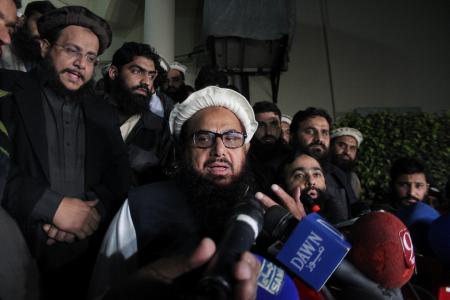
By Mubasher Bukhari
LAHORE, Pakistan (Reuters) – Pakistani police confined the accused architect of the 2008 Mumbai attacks to house arrest on Tuesday, manning barricades outside his home in the city of Lahore as supporters vowed protests.
The detention of Islamist leader Hafiz Saeed follows action by the U.S. administration of President Donald Trump aimed at countries deemed linked to terrorism, and one Pakistani official said the fear of U.S. action against Pakistan had been a factor in the decision to hold Saeed.
India has been demanding action against him since the attack on Mumbai by 10 gunmen from Pakistan, who infiltrated the city by boat and killed 166 people in a rampage that included attacks on two luxury hotels, a Jewish centre and a train station.
The attack brought nuclear-armed Pakistan and India to the brink of war. India had yet to respond to Saeed’s confinement to his home in the eastern city of Lahore.
Police detained Saeed, founder of the Lashkar-e-Taiba (LeT) militant group that India blames for the bloodshed, at the headquarters of his charity, the Jamaat-ud-Dawa (JuD), late on Monday.
Shortly before dawn on Tuesday, police took him to his house, where a Reuters cameraman saw police setting up a perimeter. They later banned media from the scene as about 100 Saeed supporters chanted slogans.
Saeed and his supporters accused Pakistan of acquiescing to the wishes of the United States, which has a $10 million reward for information leading to Saeed’s arrest, and India’s Prime Minister Narendra Modi.
“This is taking place because of Modi’s insistence, Trump’s pressure and Pakistan’s helplessness,” Saeed told media late on Monday as he was being led away.
Saeed has denied ordering the Mumbai attacks and has distanced himself from the LeT, while leading his charity.
A JuD spokesman, Farooq Azam, announced protests in the southern city of Karachi.
‘HARD DECISIONS’
The United States has listed both the LeT and the charity as “foreign terrorist” organisations. Western officials regard the charity as a front for the LeT.
The Pakistani government has not commented on why it acted now.
A senior defence ministry official said the government had not been contacted by the new U.S. administration but had been feeling U.S. pressure on the issue.
“Trump is taking hard decisions against Muslim countries, there is open talk of actions against Pakistan also. So yes, this was a consideration,” said the official, who declined to be identified.
In recent months, Saeed has been holding regular news conferences to denounce a security crackdown in the Indian-controlled part of the divided Kashmir region.
“If they believe that they can throw the Kashmir issue into the background through our arrests and our confinement, that is not possible,” Saeed said after his arrest.
Other government officials have said recently that a broader diplomatic campaign – pushed by India – to isolate Pakistan over its perceived failure to stamp out Islamist militancy has taken a toll, even involving pressure from long-time ally China.
India’s foreign ministry did not immediately respond to requests for comment.
Saeed was put under house arrest after the Mumbai attack, but was released about six months later in June 2009.
(Additonal reporting by Syed Raza Hassan in KARACHI; Writing by Kay Johnson; Editing by Nick Macfie, Robert Birsel)
